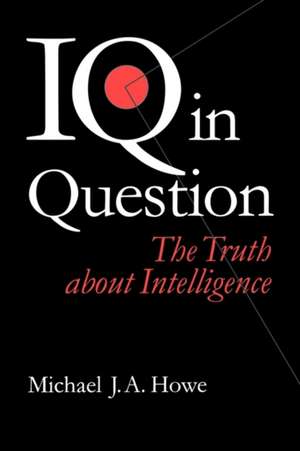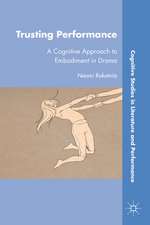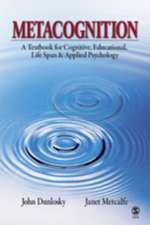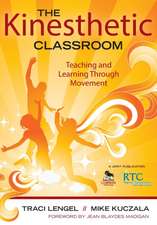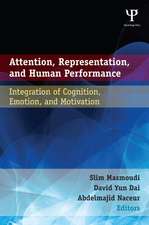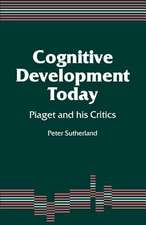IQ in Question: The Truth about Intelligence
Autor Michael J. A. Hoween Limba Engleză Paperback – 14 aug 1997
In this provocative and accessible book, Michael Howe exposes serious flaws in our most widely accepted beliefs about intelligence. He shows that crucial assumptions are simply wrong and have had destructive social consequences. IQ is real enough, but the common idea that a quality of intelligence is the underlying cause of people's differing abilities is based on poor science as well as faulty reasoning.
Offering a powerful case for a better understanding of human intelligence, IQ in Question contradicts erroneous and destructive claims such as: IQ tests provide a measure of inherent mental capacities; intelligence and `race' are linked; IQ measures are good predictors of a person's success; intelligence cannot be changed; there is a `gene for intelligence'; and low IQ always means restricted capabilities.
Preț: 439.44 lei
Preț vechi: 516.98 lei
-15% Nou
Puncte Express: 659
Preț estimativ în valută:
84.09€ • 88.02$ • 69.99£
84.09€ • 88.02$ • 69.99£
Carte tipărită la comandă
Livrare economică 31 martie-14 aprilie
Preluare comenzi: 021 569.72.76
Specificații
ISBN-13: 9780761955788
ISBN-10: 076195578X
Pagini: 192
Dimensiuni: 156 x 234 x 12 mm
Greutate: 0.32 kg
Ediția:1
Editura: SAGE Publications
Colecția Sage Publications Ltd
Locul publicării:London, United Kingdom
ISBN-10: 076195578X
Pagini: 192
Dimensiuni: 156 x 234 x 12 mm
Greutate: 0.32 kg
Ediția:1
Editura: SAGE Publications
Colecția Sage Publications Ltd
Locul publicării:London, United Kingdom
Recenzii
`In this remarkably economical, clear and informed book, Mike Howe... sets about unravelling the formidable semantic, logical and empirical knots into which IQ testers and their supporters have tied themselves... Howe suggests that we have, for decades, been asking the wrong kinds of questions. He points to the number of alternative, theoretically richer, views of human intelligence that don't reduce all to a single dimension... this is rendered with an easy, readable style which assumes no previous technical knowledge, and is therefore ideal for the introductory student, the teacher, members of other professions often exposed to (and taken in by) the myths of IQ, and even concerned members of the general public. I hope all will read it, for, in terms of general instructiveness and specific revelations-per-page, they will scarcely find a more rewarding work, nor one that will have wider implications for their hopes for children or people in general' - British Journal of Educational Psychology
`A rational attempt to present the case against IQ testing... There are fascinating nuggets of historical information scattered across the pages' - Business Standard
`Michael Howe has presented an accessible and thorough discussion of all aspects of IQ and intelligence. This book is an important counterweight to many prevailing myths' - Professor George Mandler, University of California, San Diego
`Michael Howe's book deserves to be a popular success. It presents the arguments against conventional IQ theory in a cogent and accessible style. This book responds to the contemporary "hard-line" IQ position with solid evidence for the malleability of human experience in the development of intelligence. Howe attacks the racist implications of the newly resurgent IQ movement with real science and sound argument' - Professor Roy Nash, Massey University, New Zealand
`This stimulating book calls into question a great deal of current orthodoxy about the nature of IQ and the way society interprets and uses the concept. It will disturb some readers and excite others. It is written in a refreshing style which will engage both lay and specialist audiences... the book will make a significant, if sometimes controversial, contribution to the debate about human talent and potential, as well as inform and challenge discussions abut education, training and remediation' - Professor Edward C Wragg, University of Exeter School of Education
`In this highly accessible review, Professor Howe leaves barely a stone unturned in his scrutiny [of IQ]... The result is an expos[ac]e of myths and falsehoods that will be widely welcomed for its thoroughness, comprehensiveness, readability and social implication. For all those learning, thinking or working in the shadow of IQ, this book provides a brighter light and a critical base with which to assess its true nature and its role in society' - Professor Ken Richardson, The Open University School of Education
`A rational attempt to present the case against IQ testing... There are fascinating nuggets of historical information scattered across the pages' - Business Standard
`Michael Howe has presented an accessible and thorough discussion of all aspects of IQ and intelligence. This book is an important counterweight to many prevailing myths' - Professor George Mandler, University of California, San Diego
`Michael Howe's book deserves to be a popular success. It presents the arguments against conventional IQ theory in a cogent and accessible style. This book responds to the contemporary "hard-line" IQ position with solid evidence for the malleability of human experience in the development of intelligence. Howe attacks the racist implications of the newly resurgent IQ movement with real science and sound argument' - Professor Roy Nash, Massey University, New Zealand
`This stimulating book calls into question a great deal of current orthodoxy about the nature of IQ and the way society interprets and uses the concept. It will disturb some readers and excite others. It is written in a refreshing style which will engage both lay and specialist audiences... the book will make a significant, if sometimes controversial, contribution to the debate about human talent and potential, as well as inform and challenge discussions abut education, training and remediation' - Professor Edward C Wragg, University of Exeter School of Education
`In this highly accessible review, Professor Howe leaves barely a stone unturned in his scrutiny [of IQ]... The result is an expos[ac]e of myths and falsehoods that will be widely welcomed for its thoroughness, comprehensiveness, readability and social implication. For all those learning, thinking or working in the shadow of IQ, this book provides a brighter light and a critical base with which to assess its true nature and its role in society' - Professor Ken Richardson, The Open University School of Education
Cuprins
Introduction
Doubtful Beginnings
Can IQ Be Increased?
Race and Intelligence
Is High IQ a Necessity?
Using IQ Scores To Make Predictions
Genetics and Intelligence
Newer Approaches to Intelligence
Raising Children's Intelligence
Twelve Well-Known `Facts' about Intelligence Which Are Not True
Doubtful Beginnings
Can IQ Be Increased?
Race and Intelligence
Is High IQ a Necessity?
Using IQ Scores To Make Predictions
Genetics and Intelligence
Newer Approaches to Intelligence
Raising Children's Intelligence
Twelve Well-Known `Facts' about Intelligence Which Are Not True
Notă biografică
Descriere
`Michael Howe has presented an accessible and thorough discussion of all aspects of IQ and intelligence. This book is an important counterweight to many prevailing myths' - Professor George Mandler, University of California, San Diego
This provocative account exposes serious flaws in our most widely accepted beliefs about intelligence that have influenced contemporary society. Michael Howe contradicts erroneous and destructive claims such as: IQ tests provide a measure of inherent mental capacities; intelligence and `race' are linked; IQ measures are good predictors of a person's success; intelligence cannot be changed; there is a `gene for intelligence'; and low IQ always means restricted capabilities.
This provocative account exposes serious flaws in our most widely accepted beliefs about intelligence that have influenced contemporary society. Michael Howe contradicts erroneous and destructive claims such as: IQ tests provide a measure of inherent mental capacities; intelligence and `race' are linked; IQ measures are good predictors of a person's success; intelligence cannot be changed; there is a `gene for intelligence'; and low IQ always means restricted capabilities.
